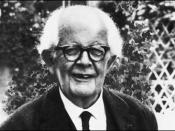Cognitive development is an intellectual growth from infancy to adulthood. Jean Piaget (1896-1980), a Swiss psychologist, was one of the most important and influential researchers in the field of developmental psychology throughout the 20th century. Piaget was born in Neuchâtel, Switzerland, on August 9, 1896. His father, Arthur Piaget, was a professor of medieval literature with an interest in local history. His mother, Rebecca Jackson, was intelligent and energetic. The oldest child, he was very independent and took an early interest in nature. He published his first paper when he was ten - a one page account of his sighting of an albino sparrow.
Piaget was the first to develop methods for studying the way infants and children see and understand the world around them. In 1918, Piaget received his Doctorate in Science from the University of Neuchâtel. He worked for a year at psychology labs in Zurich and at Bleuler's famous psychiatric clinic.
During this period, he was introduced to the works of Freud, Jung, and others. In 1919, he taught psychology and philosophy at the Sorbonne in Paris. Piaget initially trained in the areas of biology and philosophy. Piaget was very interested in how the mind worked and believed that what differentiated human beings from other animals is our capability to do "abstract symbolic reasoning." Piaget's first job as a postgraduate student in psychology was as an intelligence tester for Alfred Binet (1957-1911) in Paris. It was there he became interested in how children think. He became aware that young children's answers were qualitatively different from older children, which suggested to him that young children answered questions differently than older children because they thought differently, not because of their lack of intelligence.
As a biologist, Piaget had an interest in how an organism adapts to its environment. Behavior...


